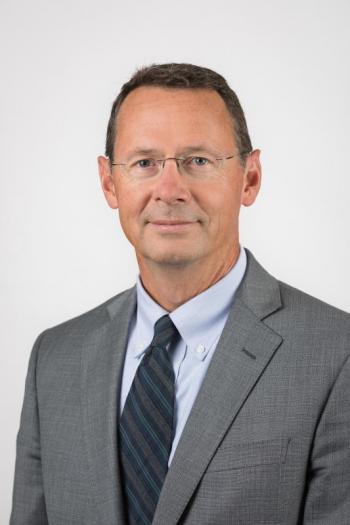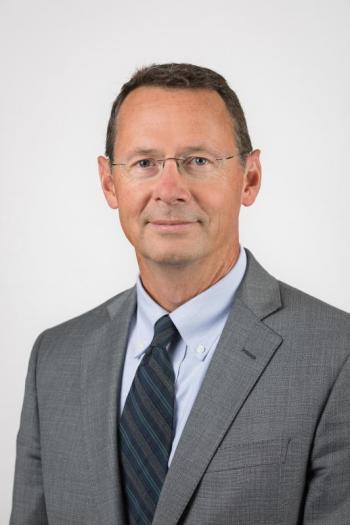Mark Fourre: ‘After more than a year of living in pandemic conditions, it is time to take better care of ourselves’
I do not know anyone who put off gathering their day-to-day essentials during the COVID-19 pandemic.
In fact, quite the opposite. People streamed into grocery stores and hardware stores to prepare for all manner of contingencies. Friends and neighbors everywhere diligently prepared for the future by braving crowds of people in order to feel more secure.
It’s the same for the human body – maintaining routine office visits and screenings prepares you for a healthy future. However, put off health care long enough – especially routine screenings like mammograms and colonoscopies that can detect diseases early when they are still treatable – and you put your health at risk.
Unfortunately, the healthcare providers at Pen Bay Medical Center and Waldo County General Hospital are seeing patients who have done just that. Their fear of the virus has kept them from seeking routine health care, especially during the early days of the pandemic when so little was known about COVID-19.
Now that they are finally coming back to their doctor’s offices, some are being diagnosed with advanced stages of diseases that, if discovered earlier, would have been far less consequential. These patients did not catch COVID-19, but they are, nevertheless, victims of the pandemic, and their stories serve as a cautionary tale: Even during a pandemic, going to your doctor is safe, and staying away will eventually put you at risk.
In fact, I believe that going to your doctor’s office is safer than ever.
The additional safety precautions that we have put in place during the pandemic have proven extremely effective at protecting our care team members and our patients.
We screen every person who works at PBMC and WCGH, including independent contractors and vendors, for COVID-19 symptoms before they enter our facilities. At work, we wear facemasks and other personal protective equipment. We rearranged waiting areas, exam rooms and workspaces to allow for social distancing. We screen all patients for COVID-19 symptoms and require them to wear facemasks during their visit. Everyone is encouraged to use hand sanitizer frequently.
While intended to prevent the transmission of COVID-19, these precautions have made our facilities safer in other ways. For example, facemasks also dramatically reduce the transmission of the flu and the common cold, and the more frequent use of hand sanitizer reduces contact with the viruses and bacteria that may lead to gastrointestinal illnesses.
This is supported by the data. Influenza infections have taken a nose dive during the pandemic. According to the U.S. Centers for Disease Control (CDC), the adoption of COVID-19 prevention measures in the spring of 2020 coincided with a huge drop in positive flu tests.
So it doesn’t seem that far a leap to say that PBMC and WCGH are safer than ever and, conversely, staying away is more dangerous than ever.
It would be easy to focus on the most dramatic stories – the returning patients with an advanced cancer that, if caught a year ago during a routine colonoscopy or mammogram, would have required only routine treatment. The patient who early in the pandemic declined to seek treatment for minor chest pains only to discover that she had managed to survive a heart attack – and now must live with a weaker, thinner heart wall that is more prone to rupturing.
We have seen these or similar cases at PBMC and WCGH and know how hard it has been for patients and their families to hear the devastating news.
However, I want to focus on two decidedly undramatic but still dangerous outcomes of deferring care and routine screenings during the pandemic.
Heather Ward, MD, the medical director of Primary Care and a family physician at Waldo County Family Medicine in Belfast, reports that many of her patients with diabetes or high blood pressure who stayed away during the peak of the pandemic have returned to her office with elevated readings. The stress of the pandemic, isolation, and decreased monitoring all contributed.
In some cases, these patients weren’t completely without medical attention during the pandemic. They continued to seek care via telehealth, meeting with their provider over a secure connection to their smartphone, tablet or laptop.
Telehealth is one of the great leaps forward the pandemic pushed us to take, and it served the needs of many patients. However, it has limitations. We cannot take a patient’s blood pressure over the telephone or draw blood for testing, for example.
Filtered by pixels, we also struggle to make the kind of eye contact that a care provider makes with a patient during an office visit. This is critical because care providers often serve not just as a source of medical knowledge but also as a patient’s health care conscience. In short, when patients know they will see their doctor in person, they tend to take better care of themselves.
Now more than ever PBMC and WCGH are committed to your care. In the upcoming months, we will welcome new providers, introduce new services and continue to grow and meet the needs of the community.
After more than a year of living in pandemic conditions, it is time for all of us to take better care of ourselves. This includes getting the COVID vaccine, something nearly every physician at PBMC and WCGH has done and recommends for all their patients.
It also includes seeing your primary care provider face-to-face and resuming routine screenings such as mammographies and colonoscopies. These all are at least as important as stocking up at the grocery store.
Mark Fourre is CEO of Pen Bay Medical Center and Waldo County General Hospital
Event Date
Address
United States

























